Six Tips From A Long-Time Dropshipper That All Beginners Should Hear
When Suhail witnessed his dad putting food down at the supermarket, he knew he had to do something.
A teenager then, he set his mind on making money online and started with eBay. He gave the first £1,000 he made selling on eBay to his dad who used the money to pay off some debt.
With a humble background, a fierce passion for ecommerce, and a persistence like no other, Suhail went on to create an online men's fashion store with resounding success. In just a few years, he'd made over £112,000.
In this episode of Start Yours, Suhail joins us to talk about his ecommerce journey, including how a music video led to his product going viral and even turned into a meme, and shares with us six valuable tips all beginner dropshippers need to know.
This is an inspiring and actionable episode so get your notepads ready to jot down those tips.
If you enjoy this episode, we hope you'll consider subscribing. There's also plenty more amazing content over at our blog, so don't forget to check those out, too.
Short on time and prefer a condensed version? Here's a nine-point TL;DR version of our chat with Suhail (including the six tips he has for beginner dropshippers):
- Suhail's first experience of being a merchant came from selling sweets at school... and then getting into trouble for it.
- After a rapper featured one of Suhail's products in his music video, the product went viral and was even made into a meme.
- Three values Suhail says led to his success: transparency, honesty, and integrity.
- Tip #1: Do it for the right reasons.
- Tip #2: Commit for at least a year
- Tip #3: Make it look quality
- Tip #4: Use those around you as a test market
- Tip #5: Start on a low budget and work with influencers
- Tip #6: Make sure your store stands out with service
Start Yours is a podcast about ecommerce, dropshipping, and all things launching a business.
Join us as we meet entrepreneurs who have gone through the triumphs and headaches of running an online store, and learn how they managed to survive and thrive.



First Exposure to Ecommerce and Dropshipping
Aleisha: Suhail, you started your business when you were 16 years old at school. That was naughty. How did that happen? And how did that affect your school life? Because I can't imagine that would have been an easy process.
Suhail: Yeah, yeah, so it was actually one day. I was sitting down in school, and in school, we have something called silent study. And in the silent study, we literally need to dedicate three hours, four hours of literally just working hard, doing homework, and focusing on the tasks which are coming up for the week ahead.
→ Click Here to Launch Your Online Business with Shopify
But what I would do is I would literally just sit in the library and instead of doing my work, I would literally just go online and try and research ways on how I can make money online. So I was reading so much online, I came across a couple of books when it comes to getting started in online businesses.
But then I came across ecommerce. And as soon as I discovered ecommerce, I literally came across a business model called dropshipping. And that's when I literally got my first exposure to dropshipping and ecommerce. But prior to that, I was already pretty much buying and selling goods on platforms like eBay, but I wanted to take things to the next level.
And the reason why I wanted to take things to the next level, was because... I actually made my first £1,000 on eBay just literally buying and selling anything that I could get my hands on.
So then, the funny thing is I actually thought to myself, "What if I could invent a model where I don't need to hold the inventory?"
So I was thinking I was a genius coming up with some amazing business model, but then when I researched it online, the business model pretty much already existed...
Aleisha: Yeah, you were beaten.
Suhail: Yeah, yeah. So I thought I was a genius, but no. It was a business model which was called dropshipping and I was like, "This absolutely makes sense," because I don't come from... I came from a family that pretty much struggled financially so my main drive was to literally just find ways on how I can develop an income stream to support the family.
And what I understood was that... Is anyone can pretty much get involved because it doesn't require much capital at the beginning to get started. So that's pretty much my first exposure to getting involved with ecommerce and dropshipping.
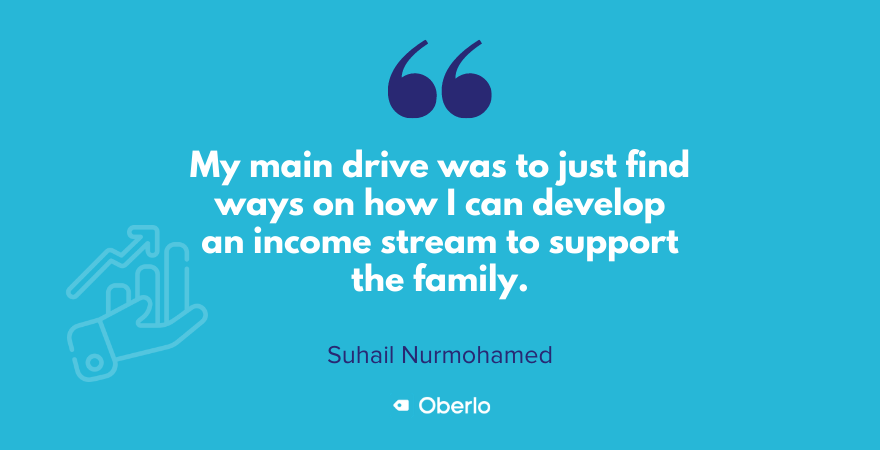
Getting Into Entrepreneurship
Aleisha: It really interests me when I speak to people, especially 'cause you are 22 now and you started as a 16-year-old, and we have lots of listeners who are under-age and we're going to be doing an episode coming up in the next couple of months talking to people who are trying to start businesses in their teens.
But it really fascinates me when I meet people that have this entrepreneurial drive as a teenager 'cause there are lots of people out there who would be like, "I'm not gonna sell, I just wanna go out and party," or "I wanna go and be with my friends."
How did you get into the idea of starting a business? I'm just so fascinated with this. Is your family entrepreneurial? Or did you just think there has to be an easier way than going to get an after-school job?
Suhail: Yes, so firstly, no one in my entire family comes from a business background. I come from an Asian household.
So for me, it's pretty much: Go to school, go to university, get a degree, and live happily ever after.
So that's what I was pretty much told. But that was something that I didn't wanna do and the reason why is because I was seeing my parents struggle at a very early age.
One day, I was at the supermarket and I saw my father put down food at the shopping... At the supermarket, right? And that was pretty much my trigger point to literally get involved in entrepreneurship. It was at that moment where I literally had like a light bulb moment, which pretty much gave me like a reality hit, to pretty much looking into ways that I can make money from home.
And what I then decided to do was I researched all the top individuals in the world who make the most income. And when I researched all of these individuals, I found out that none of these individuals were doctors. These individuals were not lawyers. They weren't individuals who have a corporate job, they weren't athletes, they weren't music stars or Hollywood actors. They were all entrepreneurs and businessmen.
And how I came across that was when I was on the Forbes Rich List. That's when I literally came across all these individuals and I started studying them. And what I discovered was something called the “cashflow quadrant,” where it says 95 percent of people in the world are employees or self-employed. But five percent of them are business owners and investors.
So that's what I started to study and research online: How can I start a business? Because at the end of the day, my objective wasn't just to make a lot of money, but it was to have time freedom as well because the difference between being rich and being wealthy, there's a big difference. You see, being rich is having money in the bank account, but being wealthy is having money and time combined. And for me, that's absolutely priceless.
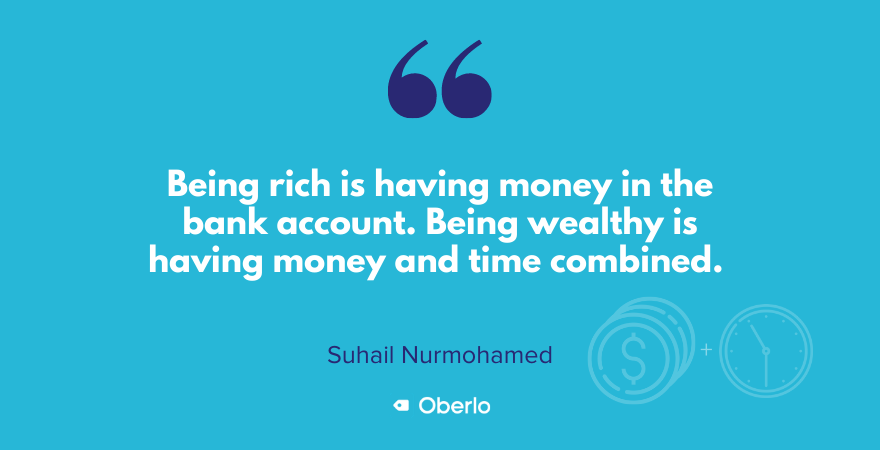
Aleisha: Were you thinking that as a 16-year-old? 'Cause that's extraordinary if that was your motivation. And I know that you said you wanted to contribute to the family, which is also really mature in the sense that you were thinking about the good of your family over you going out and hanging out with your mates and doing what normal 16... And that's an air quote, "normal" 16-year-olds do.
But that's a pretty mature way of thinking when it comes to running a business and contributing to your family's needs.
Suhail: Yeah, yeah, for sure. Yeah, that was pretty much my normal thinking as a 16-year-old. I was pretty entrepreneurial from that age onwards. In fact, I would literally go to school and literally just sell sweets.
I was known as that individual that would sell sweets to everyone in school and then end up getting in trouble because I'd get caught.
So that's what I was literally doing when I was in school. Before dropshipping or ecommerce, that's what I would do. I was the sweets boy that would literally just go around school, buy in bulk from my local corner shop, come to school, and sell it to all the kids. And I would even sell it to kids in different schools as well to make sure that I'm always leveraging. So that's all I...
Aleisha: Good, you gotta get your territory out there. I like that.
Suhail: Yeah, yeah.
Aleisha: Spreading it out.
Suhail: Yeah, yeah.
Needing a Dropshipping Model
Aleisha: Okay, so I believe you bought 100 hats, and then you sold them on eBay. Where did you get the hats? And did you store them at home? Tell me about the process of that 'cause I love these sort of beginner basic businesses where you go, "Oh my gosh, I can make money out of this." Tell me about the hats.
Suhail: Yeah, so these hats, I actually purchased from AliExpress. Now, this was way before, I believe, Oberlo even existed, so everything was manual. And at that point, I didn't know about dropshipping.
So what I did was I went onto AliExpress and with the money that I made by selling sweets, I took that money and I invested it into buying winter hats. The reason why is because it was getting very cold now and the season was coming here in the UK. So I thought, "Let me buy some winter hats, some stylish hats," I purchased them, and I literally just held the stock at home.
And then what I would do is I would literally take pictures, upload them manually onto eBay, I would write product descriptions, and then I would start selling them. And then literally, my first couple of days, I literally sold out the majority of the stock. And then what I decided to do was I decided to order even more. Once again, that stock sold out again.
And that's when I was speaking to you earlier about where I was trying to invent a model similar to dropshipping, which is absolutely insane. When I researched it, I was blown away. I was really, really excited when I discovered that dropshipping existed.
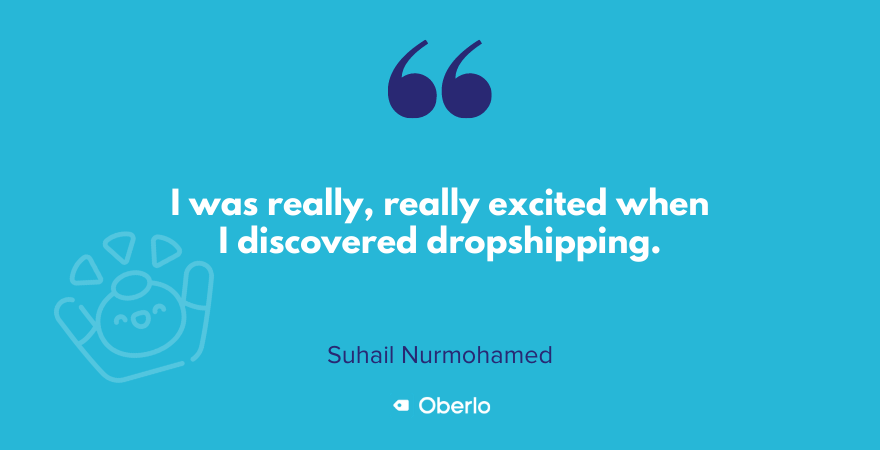
Aleisha: Yeah, it's such a great model, especially if you don't have a lot of room, if you don't have the capital, as you said, to be able to then invest in buying the hats. If you can work with the manufacturer to then get it working, that is a huge deal for a lot of people. And as you said, it can provide a lot of freedom if you do it right.
But what's interesting is you contributed this... The way I actually found you was that you did an interview with Allanah, my colleague, for the Oberlo blog. And it's so great, and I want to share some of the information that you shared in the blog post as well.
You've got some great tips about beginning to dropship and starting an ecommerce store, which we're going to get to a little bit down the track in the interview. But what really interests me is that you talked about failure and you also talked a lot about not giving up really early, which seems to be a bit of a thread in the dropshipping community especially, that people start a dropshipping store and then go, "It didn't work, I didn't make a million dollars, I'm out."
You have persistence and I think your story shows that you really stick with it, you build. You didn't go hard really quickly, though. You live within your means and you invested within your means.
Tell me, when you were at school and this was starting to cook and happen, did your parents know about it? And how did you sort of balance your schooling with this new endeavor?
Suhail: Yeah, so how it pretty much went was, so my parents actually saw me make my first £1,000 on eBay. And what I actually did was that I gave that to my father and he actually paid off some debt, and so that's when I...
Aleisha: Nice.
Suhail: Yeah, so that's when I literally got involved in dropshipping and I explained to them, I'm gonna be starting my own online store. So because they saw me have a little bit of success before on eBay, they were pretty much fine with me creating the store on the side. But they didn't want me to get distracted.
So what I pretty much did was I was creating the store, and the crazy thing is it literally... I got so excited about it, I had such a passion for it, that I actually ended up not really focusing too much on my studies in school.
I would literally have ten-hour days, nine-hour days, 11-hour days just developing my website, creating the store.
And what I actually did was, I remember, the first day when I actually made my store live, I went on Instagram, paid a page to actually shout out one of my products. And it was about 2:00 AM, 3:00 AM in the morning, and I actually just got some notifications on my phone. And I didn't think much of it because I thought it was a normal notification. I checked my phone and I saw £200 to £300 worth of sales just by one shoutout on the first night. And I...
Aleisha: So was this a paid Instagram influencer, or was it someone that you just knew and you were like, "This could be somewhere that could lead to sales?"
Suhail: So this was just an Instagram page which was more about men's fashion and I just contacted them and I said, "Can you shout out my website and my product, one of my jackets?" And they were like, "Yeah, this is the price, PayPal it to me," and I sent them a PayPal.
The Decision To Go Into Fashion
Aleisha: Okay. So let's talk about... So let's reverse a little bit here. You moved from hats and then you went into men's fashion. Tell me a little bit about that 'cause that's a complicated deal. A lot of people struggle when they get into the world of fashion, especially in ecommerce because of sizing, because of quality.
How did you launch your store? What's your store called and how did you launch it and make that decision that that was where you were going to head?
Suhail: Yeah, so after I did pretty well with the winter hats, I thought what I wanted to mainly focus on when it came to fashion, was... A lot of the fashion side, when it comes to normal clothes like jeans, jumpers, hoodies, sweatshirts, whatnot, I had that as a side, just to simply upsell. But my main focus was more about coats and winter jackets. Because once again, it was that season again.
So what I just had to do was focus more on that area because I thought if winter hats did well, then I can only imagine what would happen when people would like a jacket that looks good and it would keep them warm as well. So that's when I branched out to coats and jackets and it pretty much started picking up from there.
Aleisha: Great. So you recognized a niche and then you built on the niche when you sort of thought, "Okay, winter is where it's happening." And look, you live in the United Kingdom where winter can go on for years, so you... It's a good idea.
Suhail: Yeah, but the crazy thing is, I would say about 80 percent of the sales came from the US and I'd say 10 to 15 percent from the UK.
Aleisha: Interesting. So you started the business, you launched it, and then you... So you've moved into men's fashion. And then you did this Instagram post and it went off. What was that feeling when you started to get those sales and you realized this could be a good way to market the business?
Suhail: That feeling was incredible. I can't even explain it because it was literally 2:00 AM, 3:00 AM, I was half-asleep. As soon as that first sale came in, I kid you not, I literally did not go back to sleep. And in fact, I woke up my sister, too. And I was just so shocked because that was the first time I've made a three-figure sale on my first day. And it was just a couple of hours.
So I was absolutely shocked, I was super, super excited, I didn't even sleep, I had school the next day. But what I actually ended up doing was, I literally was so excited I shipped out that product straightaway. I even sent the customer a thank you email as well because I was so, so excited.
And I literally then just started working on my store because for me, if I was able to generate one sale just like that, I knew what I'm about to do, I am in the right niche. So it was time to take things even more seriously.
So I even started to put in more work, every single day from that day onwards.
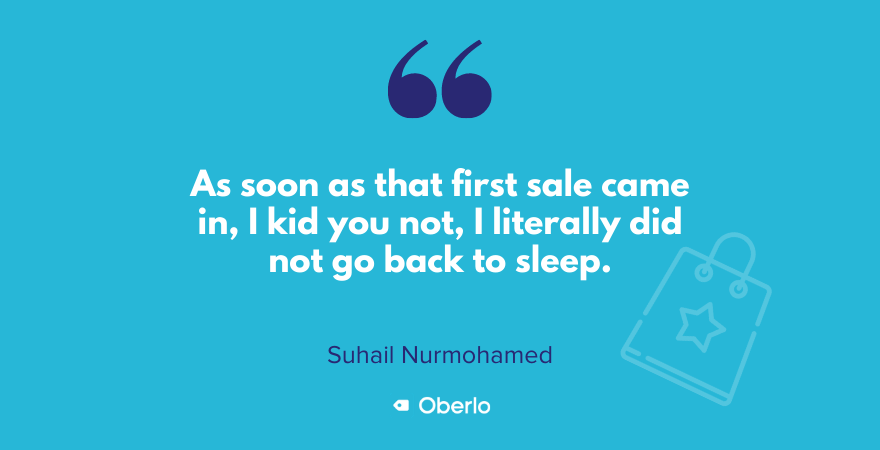
Working With Influencers... and a Rapper
Aleisha: Great. So from there, you worked with influencers, you worked online, so you really built an online profile. This was sort of three, four years ago? Tell me about the timeline of when this happened.
Suhail: Yeah, yeah. That was like three, four years ago. So that's when I had started, and yes, I had some influencers as well. And for a few influencers, I gave free jackets away. But I didn't really do that too much, I hardly did that.
The main thing that I was doing was finding great Instagram pages with great engagement, making sure that their followers are genuine, their engagement is genuine, making sure that their content is great. And what I would do is I would contact them and literally get them to feature my products.
And just through that, it was literally picking up. I would have people following my Instagram page as well and interacting with that page, too, after the shout-out, and that's where it started picking up.
And then, later on, I actually naturally did this one I'm about to tell you right now. I actually got my jacket featured on a famous music video, and I...
Aleisha: What?
Suhail: Yeah, in a famous music video. But the crazy thing is, I didn't even go out to that individual to ask them for a paid promotion or anything like that. That individual just naturally purchased it. And that individual contacted me on Instagram regarding the sizes and whatnot, and I just helped him out.
He purchased it, and he told me that he's using this jacket for a music video, so it needs to be shipped on time and whatnot as well.
And everything worked fine, it was a smooth process. The jacket fitted perfectly. And then he literally just messaged me about a couple weeks later, or a month later, sent me the YouTube link and said, "This is the music shoot, the music video." And he just wanted to be shouted out on my page that he was wearing my clothing, and...
Aleisha: Interesting.
Suhail: And then from then on, sales started to skyrocket as well. Now, I truly believe why that happened was because I was always focused on keeping the customer happy. Like if someone sent me an email, they would get a reply back within 30 minutes to an hour. That's how serious I was about customer service and support.
However, I don't really recommend that route too much for people as it can really mess up your time schedule. But I guess I literally just became so obsessed with the business, that that's all I was doing 24 hours a day, replying to emails. Like every email that came to me, I would reply within five minutes. That's what I wanted to do, provide the fastest customer service out there.
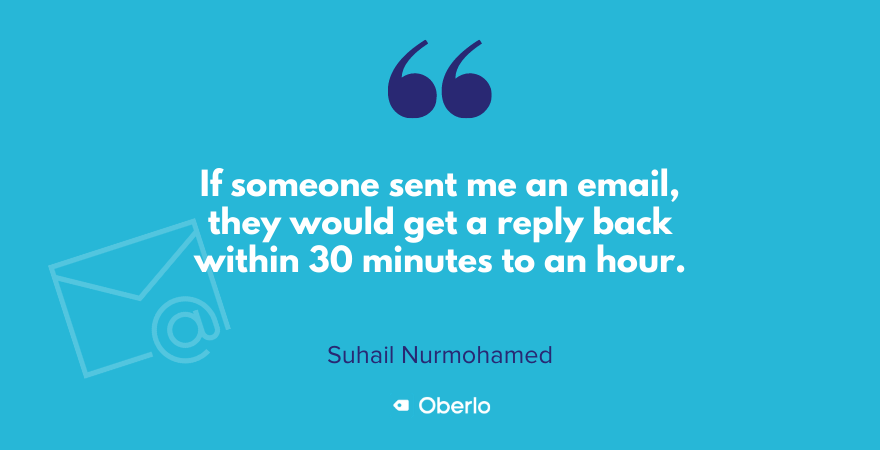
Aleisha: Well, I think it's a really good point, and it seems to be a thing that we have discovered from producing this podcast that the people that are successful are also really focused on the quality of the product, obviously, and also being attentive to their customers. So I think it's something people do have to commit the time to, and if they can't do it personally, maybe they hire a VA or someone else to help them.
But yeah, you're right. I know if I order something online and it doesn't turn up or it's faulty and no one replies to me, it really annoys me. It's my money and it's invested, so it doesn't matter if it's dropshipping.
And a lot of people wouldn't even know what dropshipping is or that if they've bought something off an Instagram ad that it's probably not coming from a company, it's coming from somewhere in China or a different factory.
So I think we need to really be aware that that's important when it comes to running businesses and you can't just let people hang 'cause they're not gonna ever come back to you again.
Suhail: Yeah, for sure.
Aleisha: So okay, you went far, you had this rapper featuring your video which is insane. You got more sales. What happened then? And I really wanna hit these tips as well, but I'm so interested in this story. What happened after that?
Suhail: So after that happened, the funny thing is, my jackets and coats literally ended up becoming like a meme. So on Facebook...
Aleisha: What?
The Importance of Social Proof
Suhail: Yeah on Facebook, there was a point where I was pretty much getting viral, where there would be like boyfriends tagging their girlfriends saying, "Get me that jacket from the store." And there would be like memes. And then the girlfriends were replying back saying, "You want that jacket but you can't even work a job. So you're expecting us to get it?"
Yeah, it was like a funny trend going on. So we actually ended up naturally becoming a meme, and people tagging one another, tagging each other, people commenting, "Where did you get that jacket from?"
And then, because people saw social proof in the comment section, people showing that they purchased the jacket and wearing it, it boosted the trust and confidence for the customer, for the potential customers to purchase from my store as well. So I think the social...
Aleisha: Let's talk about that. Just go back again 'cause I think that's huge, people really ignore that, social proof. Tell me more about social proof, and how that's helped your business 'cause that's a massive thing that a lot of people ignore when it comes to running e-com.
Suhail: Yes, social proof, I would say super, super important especially right now. You can't just expect to have a store and upload the product. What would increase trust immediately for a potential customer is seeing, for example, somebody else, an existing customer, taking a picture with your product.
And maybe that can be on your website where you have a gallery section, or it could be naturally in your Facebook comments because that's what really, really helped.
It started creating trust. It started creating more of a brand around it as well.
And when a potential customer... The majority of people online are wary of purchasing online before. They check reviews, they check certain things that need to tick, they need to have certain things to tick off before making that purchase. So you can have like badges, security badges on your website and whatnot, that's all great. But at the end of the day, the best way of social proof is being able to see that product being used by somebody else that purchased it from that exact same store.
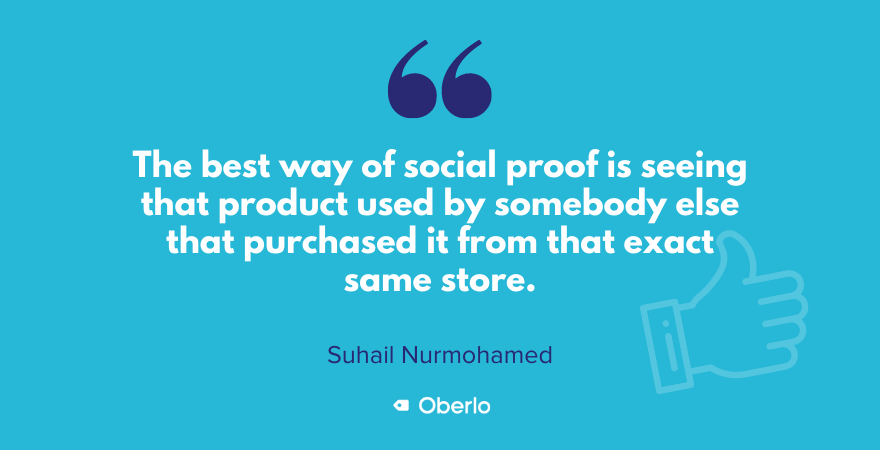
The Right Approach To Starting an Ecommerce Business
Aleisha: That's great. And I think it's something that you see often people are sharing, if you have come up with a hashtag or if you can add, especially on your Shopify stores, you can add a social proof box where people can upload them using the product. That's huge. I know I certainly look at things, especially when it comes to clothing, seeing how things fit on different body shapes and looking at the quality of it as well.
That's something I wanted to ask you about. When you're selling clothing, how did you find your manufacturers and make sure that you were selling something that was worthy of your brand, that was good quality, and that wouldn't mean that people were emailing you at all hours saying, "This is crap"? So how did that all work for you?
Suhail: Yes. So firstly, what I did was… Number one was to build an amazing relationship with the suppliers. I believe that's really important. Many people are just importing products, not building a relationship and that's the first reason why people do not have a sustainable business or a long-term business, is because they haven't established a relationship with the supplier. So that's number one.
The first thing I did was establish a great relationship where I can have constant communication with them, ask as many questions as I want.
The second thing I did is before I even sold a product, what I did was I ordered a bunch of products home first to try it out myself. I got my parents to take a look at the product, I got my sister to take a look at the product, and I got feedback from them, what do they think of the quality, and they were super, super happy with the quality.
We were also taking into consideration how long it took to arrive in the UK, which is about nine days, which is pretty good. And yeah, that's what we did. That's what I did.
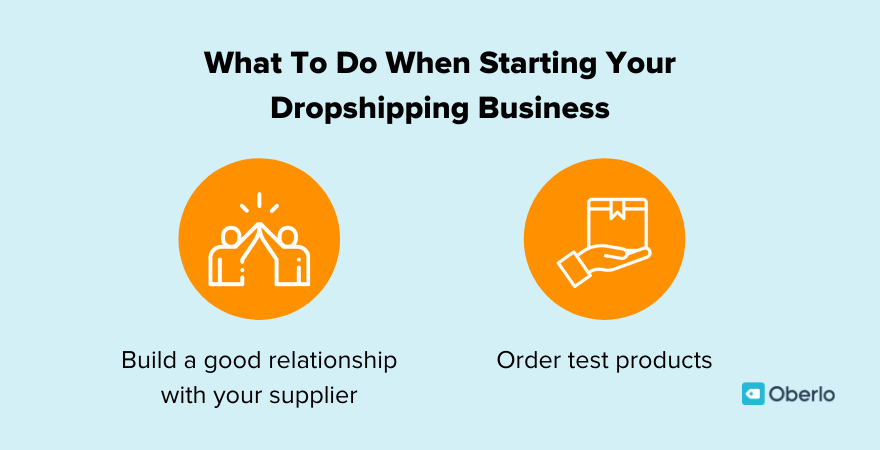
Aleisha: Looking at the arrival time and also communicating with manufacturers, obviously, at the moment when we're recording, we're still in the midst of COVID and that has been a bit of an upheaval for a lot of people running ecommerce and especially dropshipping stores as well.
Before we head to your six tips, do you have any tips about how people should be communicating with manufacturers and shipping merchants as well during this time?
Suhail: Yeah, I think at the end of the day, as long as you've built a relationship with your supplier, they're always going to be having constant communication with you. So they will always be able to assist you as long as you've got that relationship. If you do not have that relationship, I think many people will struggle.
But if you don't have that relationship, you can take into consideration secondary factors like reviews that they have on their stores, the rating of that supplier, so on and so forth.
When it comes to the situation with COVID-19 right now and when it comes to shipping timeframes, I believe the best thing that anyone can do for a customer is to be completely honest and transparent.
Because at the end of the day, so many businesses out there have been affected by COVID-19. And it is absolutely understandable by everyone out there. Every single customer should be able to understand because the whole world has slowed down due to COVID-19. Well, except like Amazon, and also Jeff Bezos, they're on another level.
Aleisha: Jeff's doing fine.
Suhail: Yeah, so like restaurants. If you take a look at restaurants, they've had a setback. If you take a look at hotels, they've had a setback. If you take a look at any industry right now, the majority of industries have had a setback. So it's fine. It's okay. People don't need to panic too much. As long as you're honest with the customer, that will be fine.
And at the end of the day, that's what I built my business off, was transparency, honesty, and integrity.
I think that's what's super, super important. And those, I would say, are some of the core values every single ecommerce individual or dropshipper should have before starting an online store because if you don't have the right approach, the integrity behind it, if you're just in it for the money and you're not here to actually provide some value to the marketplace, you'll be wiped out by an individual that does provide value to the marketplace.
Aleisha: Yeah, strong words, and I agree. And it's so easy to add, as you said, the transparency. I've got an ecommerce store. I've got a banner across the top just saying, "Just please be aware that shipping may be delayed." And then also in my pre-written communications that go out when people order, I remind them again, "So sorry, this might be delayed."
It's not hard to do. But also, it just reassures people, and then they can't really come back at you and say, "But you said it would be here in three days," when you're actually like, "Well, we've warned."
Six Ecommerce and Dropshipping Business Tips
Okay, let's hit the points. You made some really good, very tight and bright points about people starting ecommerce and dropshipping stores, about... Just some basic tips. The first one was, do it for the right reasons. Tell me a little bit about that. You've sort of just touched on that actually a bit, but tell me a bit more about that.
1. Do It for the Right Reasons
Suhail: Yeah. So I would say, what I mean by doing it for the right reasons is, and this is what I personally think is the biggest problem in dropshipping and ecommerce. Majority of the people are starting stores just thinking about themselves, which is fine. At the end of the day, of course, you're here to create additional income for yourself and reach your goals and whatnot.
But the majority of people are just so focused on themselves that they're not putting the customer first, they're putting the customer second. But in business, how you win is by having a customer-centric strategy and putting the customer first and yourself second.
So by doing it for the right reasons, it's all about, once again, providing value to the marketplace.
If you're looking to start a dropshipping store just to make like a couple of thousand, $2,000, $4,000, $5,000 dollars, you're not really gonna do well, and you're starting it, again, for the wrong reason.
Many people are looking at ecommerce, like, how much money can I put in, and can this money be flipped to X amount within a certain timeframe? And that is the wrong reason to be starting up a store and that's what would actually end up giving this industry a bad name.
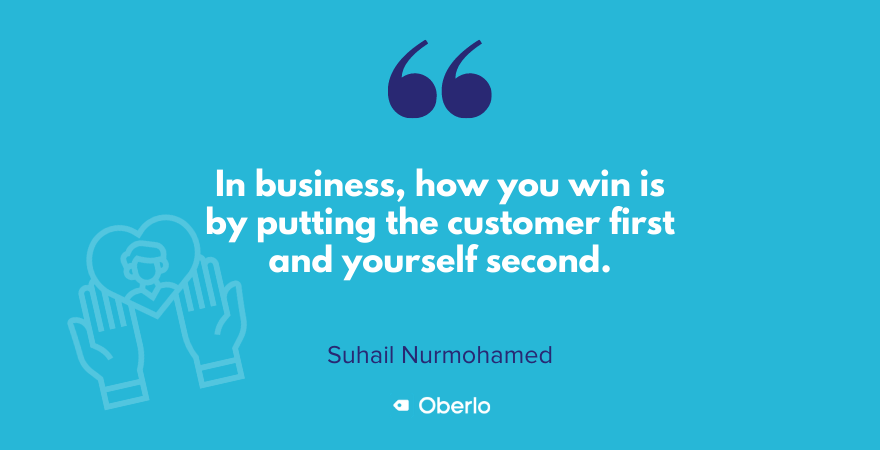
2. Commit for at Least a Year
Aleisha: Yeah, so you also suggest that... The second point is committing to it for a year. Do you suggest that we talk about flipping and niches and all this sort of stuff? Do you mean committing to one store or just committing to the whole process for the year?
Suhail: Yeah, so even if you are... So I wouldn't say you would necessarily need to commit to just one store for the entire year because maybe you would be able to learn something and you may have made a mistake when it came to choosing your product, or you may have come across something which may not have worked out. So it's fine to start up another store.
But what I mean by that is, is simply be committed to dropshipping in particular for at least one year. It doesn't matter that you fail, set up one store, and then you set up a second store. It doesn't matter if that second store fails. And you're starting a third store. It doesn't matter that the third store fails, and you set up a fourth store. Just keep going for one year because, from that first store or second store which failed, you actually learned something.
Every single failure that you go across is just a learning process. It's growth.
It's when you're growing as an individual to understand what went wrong, what did you learn from it, and now you know what you need to do next. All you need to do is execute. Because many, many people don't know how close they are to actually having a breakthrough and they end up giving up just because they let their emotions come in through the way.
And that's why I say that before anyone should even get involved in dropshipping, the first thing that every single individual should do is work on the mind because your mindset is everything. Mindset will either break your business, or you're either gonna have a successful business or you're not. It all comes down to your mindset.
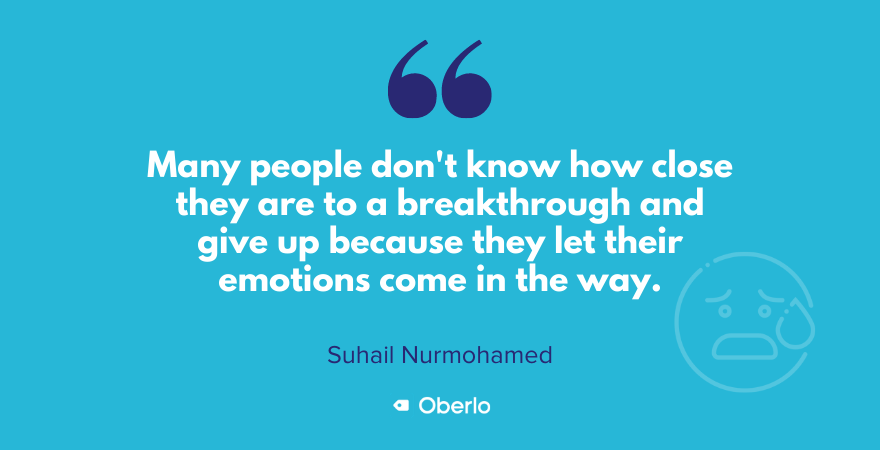
Aleisha: Suhail, I'd say that most of the... 100 percent of the people I've interviewed for this show have had multiple businesses prior to their success. And I think that seems to be a very common thing when it comes to entrepreneurship, that you aren't gonna crack it on your first go. And if you are, you are a complete anomaly, let's just say. So yeah, I totally agree.
3. Make It Look Quality
Your third point was, make it look quality. And you touched on this before, you seem to spend a lot of time making your shop and your store... And this is prior to, I'm sure, being able to look at some of the templates that are available now. But you really spend a lot of time making your store look schmick. Tell me more about that.
Suhail: Yeah, for sure. What I did was, in the beginning, I pretty much used a free template 'cause I didn't have much money when it came to starting the store. But what was the first thing I did as soon as I generated my sales?
In fact, after a couple of weeks or a month or two, I literally just started taking every single profit that I made and heavily invested it back into the business.
Now, how I did this was by literally working on the website. Firstly, I literally got an amazing theme, I paid extra for it. I paid for a bunch of applications as well, and I decided to make this website look like a professional store, where if I was to put myself in the customer's shoes, would I even like to surf on this website? Was it convenient? Was it easy for me to navigate my way through the website? Was it a smooth process? Do I like the website? Is it user-friendly? How is the user interface? What does the design look like?
So that's what I pretty much mean by making it look quality because if it doesn't look quality, the individual wouldn't expect the product to be quality either. If you're expecting to sell a quality product, then have a quality website to back you up. If you have a website that doesn't look great and it looks like Microsoft 2004, then you're not really gonna end up getting any sales, and no one's gonna be taking your website seriously.
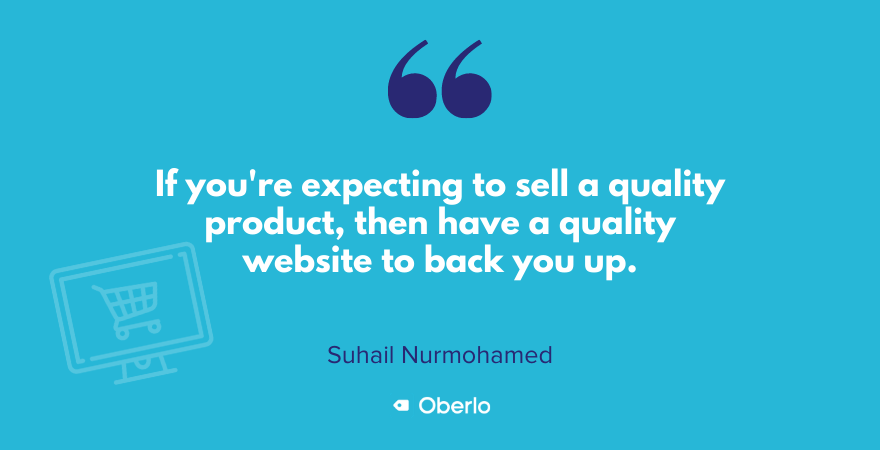
Aleisha: And also, as you said, you investing in the apps and the extensions, they save you time, so if you spend 50 bucks, it could actually make you the 50 bucks back in the time that is saved. I found that so much.
I used to be a bit of a tight-arse when it came to that stuff, but I have now invested in lots of apps within my store. And it's made such a difference to my life as well, that I'm not having to do all these menial tasks when it's just doing it for you.
Suhail: Yeah, for sure. These applications really, really helped me. For example, I had some applications which would help choose... Automatically converting the currency, depending on what country you're in. I had an application where if you're leaving the screen and you're about to click X, you can choose to put your email in and get 10 percent or 20 percent off. We had certain applications running there, which literally really, really helped.
One of the applications which also helped me was an application where we were able to upsell the customer on different products. For example, if you purchased a jacket, I would show you an amazing sweater to go with it. So those things really helped.
4. Use Those Around You as a Test Market
Aleisha: Yeah. The fourth point was, use those around you as a test market. Now, are you talking about family and friends? 'Cause you did say... I liked that you said you purchased your items and made sure that the quality was there. What else do you mean by that point?
Suhail: Yeah, so what I did was... Because at the end of the day, because it's your own store, you might have a personal bias towards it. So for example, if I'm starting my own fashion store and I ordered a jacket, firstly, I'm super, super excited because it's my store.
And because it's my store, I'm gonna be a little bit more biased towards it.
Now, what we need to do is we need to put our emotions to the side. And what we need to do is take constructive criticism, or take some analysis or a bit of research from friends and family to see what they think in particular about the product.
Would they actually wear it? Would they recommend it to anyone? Do they think that it stands a chance in the marketplace? And those things pretty much gave me a second eye, a third eye, a fourth eye, to pretty much tell me whether this would work or not and that there's actually a demand for these types of products.
5. Start on a Low Budget and Work With Influencers
Aleisha: Sure and your friends and family are probably gonna be pretty honest and say, "That looks crappy. You can improve it." Or maybe they think it's great. Excellent point. Okay, number five is starting on a low budget and then using influencers, as you did.
Now, the tide has changed a little bit with the way the influencers work, especially in our current situation. How do you recommend that we can use influencers in this day and age when no one can go anywhere or look flashy anymore?
Suhail: Yeah, so I think now what we need to do is become a little bit more creative. I think it comes down to being more creative, but what I would do is I would literally use... Look, at the end of the day, as long as someone has a budding desire to accomplish anything when it comes to dropshipping, they're gonna do amazing, they're gonna end up finding a way on how to get it done.
So what I would do, what I would recommend, is people to just contact and speak to as many influencers out there or as many pages out there. People don't...
Let me tell you one thing. In this industry, people don't wanna do the dog work. That's the problem.
People want it the easy way. The easy way doesn't exist. Even if you end up getting something done the easy way, you're gonna have an easy way out. So what I would do is, at the end of the day, it comes down to literally... I can take out an hour right now and contact 50 to 100 influencers right now on Instagram. And I know, regardless, after I filter through everything, I can come across at least ten great individuals that I can work on being creative with them.
Now, because of COVID-19 and because there might be delays on shipping and whatnot, I can, for example, get these individuals to just go on Instagram, create a story of themselves speaking, and maybe flipping the camera showing my website, and saying that, "This company has got some amazing jackets." And yeah, that's something that could pretty much help.
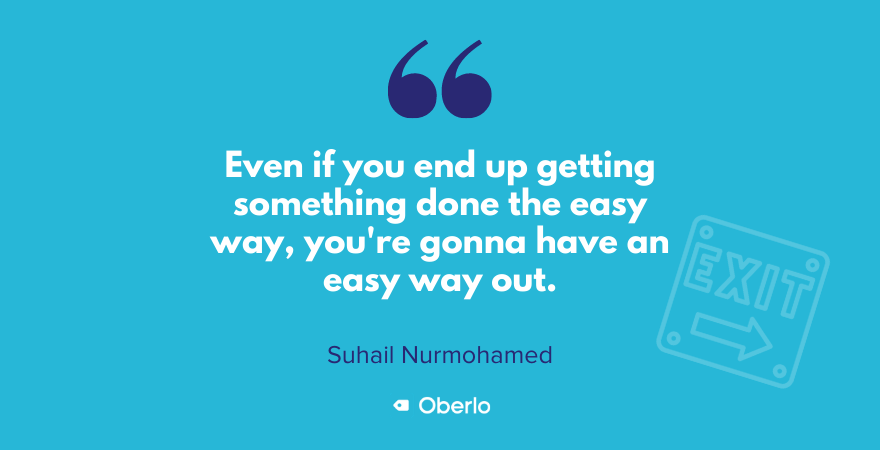
6. Make Sure Your Store Stands Out With Service
Aleisha: Right. No, totally right. If you've got the drive and you can think naturally, there's always a solution. You are absolutely right.
Final point, make sure your store stands out with service. Now, we did touch on this earlier, and it's really important that people listen to this 'cause I think a lot of people just start the store and then just walk away from it.
Give us your best customer service tips. What should we be looking out for? How should we be responding to people, especially if they're not happy, which happens a lot?
Suhail: Yeah. Okay, cool, cool, cool. When it comes to customer support, what I'll recommend firstly, is have a daily method of operation. So you should have a certain time throughout the day where you dedicate that specific hour or two hours just to customer support, ensuring everyone has a response, whether that's on email, Instagram, Facebook, Twitter, whatever platform it is that you're marketing on.
It's also very important that you set up professional emails and not standard emails because that's very unprofessional. And once you get it, it doesn't look good.
Now, when it comes to a customer who is angry or upset at you, it's very important to not think about your pocket. And if there's anyone that's listening to this podcast, and if they're even taking notes, don't think about your pocket when the customer is upset, because if you think about your pocket when the customer is upset, that customer is now gonna go out there and spread that information about your store elsewhere.
They could end up leaving a bad review, they could put it on their Instagram story. And if you're actually thinking from a business perspective, then that's gonna damage your pocket more in the long run than short-term thinking right now.
So what I would do is, and this is what I personally did, whenever I received a complaint by a customer or whatnot, I would literally reply pretty quick, and I would provide a solution straight away. I wouldn't think about myself.
In fact, because we're in the industry of dropshipping, what I recommend to people is whenever there's an issue with their product, I would literally just give store credit back right away so that they can purchase something else. And the store credit is enough where it puts me at break even. So I don't need to worry about making a profit, but I don't need to also worry about making a loss, but I'm at break even.
Or secondly, let's say there's a big problem. What I would do personally is I would give that customer a refund, I would apologize, and in return for the mistake, I would also give them a ten percent, 20 percent discount on top of that just to keep them happy if they were to return.
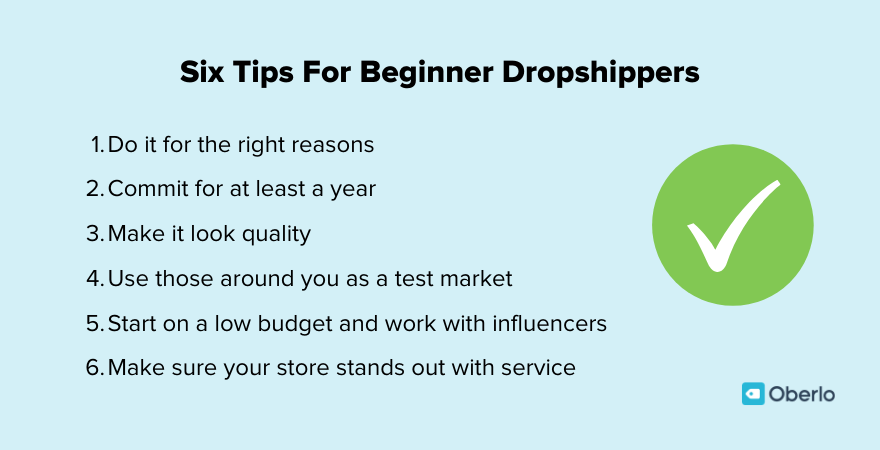
Aleisha: Yeah, great. You just kill them with kindness. I totally agree. And I think it's also... As a store owner as well, I totally connect with what you're saying because you kill people with kindness, think about what I would want to receive as a customer.
And if you take the loss, or as you said, break-even, at least they will not trash you to their friends and family, and people might come back and make a contribution later on. It's fantastic.
Suhail: For sure. For sure. It's all about protecting the brand.
Aleisha: You have been a wealth of information and I'm so grateful for your time. If people wanna get in touch, I know you do a bit of training and you are into mentorship. How can people see what you do and connect with you and also improve their ecommerce businesses and dropshipping businesses as well?
Suhail: Yeah, so if anyone wants to reach out to me or contact me or see what I'm up to now on a day-to-day basis, they can check out my Instagram. It's @suhailnurmo which is S-U-H-A-I-L-N-U-R-M-O. I believe the Instagram is also attached to one of the success stories as well, where the article was written by Allanah.
Aleisha: Yes. Suhail, we will share that, and also, we will tag you in our social media posts, so if you are following the Start Yours Podcast on Instagram, you'll see that coming up this week. And also, check out the blog, Alannah's blog was great, and it really got me motivated as well. So thank you for your time and for staying up late and chatting to me.
Suhail: Thank you very much. It's my absolute pleasure. It was great speaking with you but I'm still gonna be up, I'm working. I'm seriously...
Aleisha: Of course you are. Of course you are. He's not going to bed early.
Suhail: Yeah, thank you very much.
Aleisha: Thank you.


